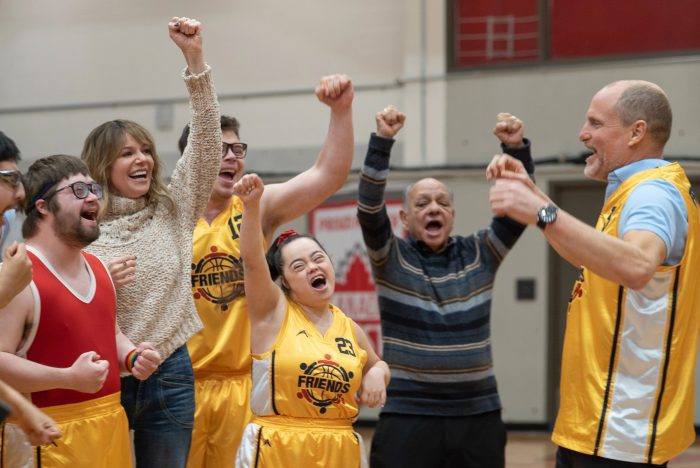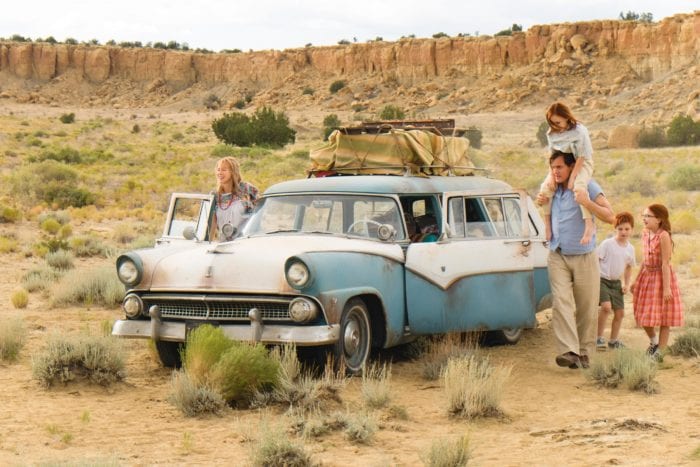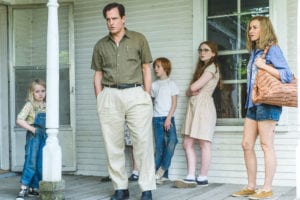Reviewed by Jeffrey Sanzel
After being ejected for shoving the head coach, disgraced minor league basketball coach Mark Markovich (Woody Harrelson) goes on a bender, hitting a police cruiser. Given a choice between eighteen months in jail or ninety days of community service, he opts for the latter. His sentence is to work with The Friends, the local recreation center’s intellectually challenged basketball team.
“What do I call them?” Mark asks the judge. “I suggest you call them by their names,” the judge replies.
Therein lies the heart and head of Champions, a sweet, predictable, but sincere comedy.

Champions is based on Campeones, Javier Fesser’s 2018 Spanish film which was inspired by a team created with people with intellectual disabilities that won twelve Spanish championships between 1999 and 2014.
Bobby Farrelly (working solo for the first time) takes a straightforward approach in directing Mark Rizzo’s workmanlike but satisfying screenplay, resulting in a simple but heartfelt story. Thematically, Champions trods no new ground. Mark is a man who “can’t stick” anywhere, bumping from job to job—Ohio to Greece to Turkey to Iowa—his inability to connect results from a combination of anger and almost terminal self-absorption.
While working with The Friends, Mark is more transformed than transforming. As much as he affects the team, he learns to see the players as human beings—something absent from both his personal and professional lives.
Harrelson’s performance offers nothing surprising, but that does not make it ineffectual. He shows restraint, an ability to listen, and seems fully present. His metamorphosis from ambivalence (texting during their first game) to commitment (running up and down the sidelines) is obvious but acceptable. He manages to make Mark’s retreat from self-destruction believable.
There are the inevitable plot bumps and the requisite speech about what it is to be a champion. A particularly clumsy comedic interlude involves raising money for the trip to Canada. But these are to be expected. Champions is a light narrative, not a revelatory documentary.
Mark becomes involved with Alex, player Johnny’s sister. An actor of a certain age, she tours in her van, presenting Shakespeare to middle school students. The Shakespeare piece integrates later in the film but is a bit forced. It’s Always Sunny in Philadelphia’s Kaitlin Olson makes Alex mildly tough and likable in a mostly limited role. Her fear of Johnny moving into a group home offers an alternate familial insight and provides her with her best moments.
The film triumphs in its small moments. The center’s director, Julio (beautifully methodical Cheech Marin), describes the players, and we are shown moments of their day-to-day lives. One works at an animal shelter; another is a master welder. These glimpses are gentle, tacit, and entirely real. Whether seeing them at work or home, these slivers are wonderfully honest and exposed without feeling intrusive.

The soul and driving force of the film are the ten intellectually challenged team members, played not as victims or outsiders but as wholly realized individuals. Whether it is Casey Metcalfe as savant Marlon, expounding a wide variety of trivia, or James Day Keith’s Benny rehearsing a speech to request time off from work, they are riveting in their presence.
Madison Tevlin is delightful as the team’s sole female, the no-nonsense Consentino. Kevin Iannucci mines Johnny for dimension and heart. The most powerful scene involves Joshua Felder’s gifted Darius. A car crash survivor, the confrontation with Mark addresses the horrors of DWI. If a bit facile, the validity cannot be denied.
Is Champions exploitive?
For over a decade, Matt Nelson has worked for Evanston Special Recreation. He has coached basketball, track and field, powerlifting, swimming, volleyball, softball, and flag football. In addition, he has been the assistant athletics coach for Team Illinois at the 2013 USA Games (Seattle) and the 2022 USA Games (Orlando).
In speaking with Matt on this question, he responded: “Champions is super realistic in its portrayal of a Special Olympics team with regards to their athletic abilities and the individual personalities of each athlete. Each one of my athletes comes from a different living situation—group home, living with parents, living on their own. The movie is no different and stresses how each athlete has a unique story to tell. My teams always succeed the most when they work as a team which Champions accurately portrays. And both my team and I loved the ending and thought it was PERFECT.”
The film’s climax occurs at the North American regionals during the Winnipeg Special Olympics. In agreement with Matt and his players, The Friend’s final shot has a reverberating emotional justice.
Those looking for great depth and searing truth will find this a slight outing. But for a feel-good sports movie that gently celebrates a unique group of underdogs, Champions delivers. Ultimately, the moral comes not from Mark but from the team. “We play for each other.”
Rated PG, Champions is now playing in local theaters.



 The second chapter, “The Yacht,” sees the couple on a high-end ocean excursion populated solely by the wealthy. Among the guests are a gregarious Russian fertilizer mogul, Dimitry (Zlatko Burić), and a sweet elderly British couple, Winston (Oliver Ford Davies) and his wife, Clementine (Amanda Walker), who are arms manufacturers.
The second chapter, “The Yacht,” sees the couple on a high-end ocean excursion populated solely by the wealthy. Among the guests are a gregarious Russian fertilizer mogul, Dimitry (Zlatko Burić), and a sweet elderly British couple, Winston (Oliver Ford Davies) and his wife, Clementine (Amanda Walker), who are arms manufacturers.






